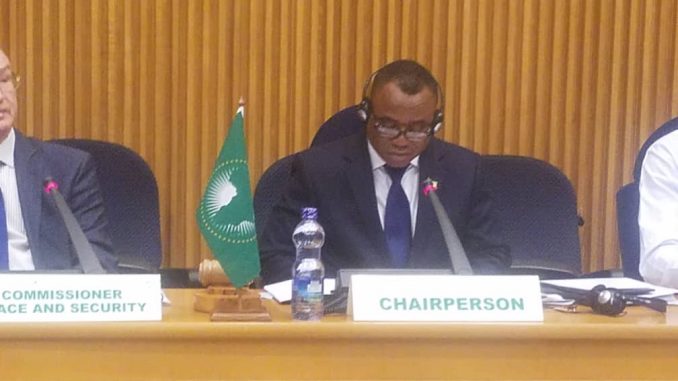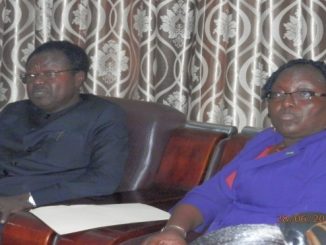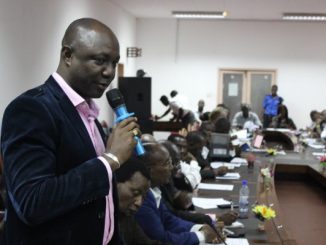
By Jonathan Las-Lamin
On Friday 1st June, 2018 the Republic of Sierra Leone assumed the leadership of the African Union Peace and Security Council (PSC) and held its first meeting under the Chairmanship of Ambassador Osman Keh Kamara, the outgoing Ambassador of the Republic of Sierra Leone to the Federal Democratic Republic of Ethiopia and Permanent Representative to the African Union and the United Nations Economic Commission for Africa.
In an Open Session the meeting discussed the topic: “The Delimitation and Demarcation of Boundaries in Africa the way forward to resolve interstate Conflict in Africa”. Other items and reports to be discussed during the month are: The Special Report of the Chairperson of the AU Commission and Secretary General of the UN on the Strategic Review of UNAMID; Briefing on the situation in the Democratic Republic of Congo, Preparation for the Annual Joint Consultative Meeting between the AU Peace and Security Council and the UN Security Council; Report of the PSC on the activities and State of Peace and Security in Africa; Draft Report of the PSC on the Implementation of the AU Master Roadmap of the Practical Steps to Silence the Guns in Africa by the Year 2020; Refugee, Protection, Migration and Human Rights in Africa ect.
All meetings of the PSC for the month of June 2018 will be chaired and moderated by Sierra Leone, either by His Excellency President Brigadier [Retired] Julius Maada Bio – in the event of an Extra-Ordinary Summit of the African Union Peace and Security Council of the Assembly; or by the Minister of Foreign Affairs and International Cooperation, Dr. Alie Kabba – in case of an Extra-Ordinary Executive Council Meeting of the African Union Peace and Security Council.
Please find below the opening statement by Ambassador Osman Keh Kamara during the inaugural PSC meeting on Delimitation and demarcation of borders(African Union Border Program):
Opening remarks by Ambassador Osman Keh-Kamara, Chairperson of the Peace and Security Council for the month of June 2018, at the Open Session of the Peace and Security Council on the Progress of the African Union Border Programme (AUBP) 2017- 2018
Excellencies, Permanent Representatives of the Peace and Security Council,
Excellencies, Permanent Representatives of the African Union,
Excellency, Ambassador Smail Chergui, Commissioner for Peace and Security,
Excellencies members of the Diplomatic and Consular Corps,
Distinguished invited Guests,
Ladies and Gentlemen,
I wish to welcome you to the 777thsession of the Peace and Security Council on the Progress of the African Union Border Programme for the year 2017 to 2018. The legacy of Africa’s colonial history for many states includes numerous post-Independence national boundaries that are unclear and sometimes violently disputed. Only a third of the borders in sub-Saharan Africa are clearly delimited and demarcated. The African Union (AU) considers ill-defined borders as potential sources of conflict, especially when natural resources are discovered OR maritime resources straddle in the border regions. Such borders are threats to peace and security, and hinder regional integration, economic growth and development.
Our leaders, recognizing the ill-defined and porous nature of our borders and their role in the conflicts and disputes that plague our continent, established, in 2007, the African Union Border Programme (AUBP). AUBP contributes to the structural prevention of conflicts through the delimitation and demarcation of borders. It also offers a platform for the negotiated resolution of border disputes and the promotion of regional and continental integration through cross-border cooperation.
The AUBP’s three areas of activity include: assistance to AU Member States in the delimitation, demarcation and reaffirmation of all African borders by 2022, the promotion of cross-border cooperation, and the development of the technical capacities of personnel in charge of border related issues.
This session of the PSC aims to encourage Member States to take the necessary measures to jointly manage their common borders. The effective management of borders and border regimes in Africa addresses three essentials. First, it considers the geo-political, which relates to the peace, security, and stability necessary to prevent conflict. Second, the geo-economic, visible and well-managed borders enable economic exchanges that benefit all parties, in particular, border populations. Third, the socio-economic, in which local cross-border initiatives may proliferate, deepening integration. As such, effective and sustainable border management will prevent conflicts between African states, foster integration through peaceful, open and prosperous borders; and may equally serve as a spin-board for the implementation of the Continental Free Trade Area (CFTA) decision recently adopted by the African Union Assembly on the free movement of persons, goods and services across the continent.
Last but not least, on the 7th of June 2018, we will celebrate African Border Day, as we did in previous years, since its establishment by the African Border Ministers on May 25, 2010. This year, we will celebrate the AU Border Day on the border between Rwanda and the Democratic Republic of Congo. The reason the AU Commission chose to celebrate the AU Border Day at that location is because of the example it sets in terms of free movement of people, cross border cooperation and regional integration. More than 90,000 people are registered daily on that border which is the biggest in Africa, and only second to the border between the United States of America and Mexico. Meanwhile, trade between the two countries amounted to USD 164.5 million. More importantly, they have established a One Border post to facilitate the free movement of people and goods.
It is our hope that we will see more cross border cooperation between our Member States in order to realize the dream of “the Africa we want” as articulated in Agenda 2063.
Thank you for your kind attention.



